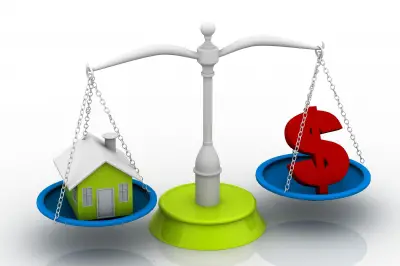If you qualify there are some great benefits to FHA loans, (as well as a few disadvantages). In this post, we’ll show you the advantages and disadvantages of FHA loans (and 23 FHA Loan Secrets). To help you make an informed decision on whether an FHA loan is right for you.
The Pros of an FHA Loan
The major advantage to an FHA loan is that the Federal Housing Authority (FHA) backs them. This backing means that if you default the Federal Housing Authority reimburses the lender for the loss. Why is this an advantage to you? Because less risk to the lender means they can charge you a lower rate.
That makes FHA Loans cheaper compared to other options. The loan requires less money upfront on the monthly payments calculator. It requires only three percent down instead of anywhere from 5% to 20% demanded by many conventional home loans. It becomes easier to qualify than if you are trying to buy a property with a traditional mortgage.
Another advantage to getting an FHA loan is allowing borrowers who do not meet high-income requirements to access funds. According to FHA loans Cincinnati “FHA loans have more lenient borrowing requirements regarding credit scores, debt-to-income ratios, and down payment amounts, allowing more people to own a home even with imperfect finances. Unlike other mortgage options, like Fannie Mae and Freddie Mac that require borrowers to meet predetermined income levels, you can be eligible for an FHA loan regardless of how much money you earn.”
The Cons of an FHA Loan
Mortgage Insurance
Although with an FHA loan you don’t have to get “private mortgage insurance” aka. PMI for an FHA loan, you will need to pay a mortgage insurance premium (MIP) of roughly 1.75% of your total loan amount at closing — most borrowers roll this amount into their mortgage, eliminating the upfront expense. Additionally, an annual MIP amount will be calculated but paid monthly.
Primary Residence
In order to qualify for an FHA loan the home you want to buy must be “structurally safe and habitable”. So, you can’t use an FHA loan for a fixer-upper that requires you to live somewhere else while you renovate. The home must be your primary residence so FHA loans also can’t be used for vacation or rental properties.
Other Requirements
You must be at least 18 years of age and have two years of work history verifying a reliable income stream. Your credit score must be at least 580 to qualify for a 3.5% down payment. Your debt-to-income ratio, including student loans, must be less than 50%.
You must go through an FHA-approved lender and have an FHA-approved appraiser do the home appraisal.
Closing Thoughts
There are many benefits of an FHA Loan. It’s an excellent option for first-time homebuyers or people who have less than perfect credit. Make sure you compare all your options before deciding on the type of loan you want to apply for. As with any financial commitment, borrowers must understand their rights and responsibilities. If you have been looking into homes with your realtor or agent lately, then it’s good to ask them if an FHA loan might work well for you.
In most cases, this type of loan does allow people who would not otherwise qualify for a mortgage. Access to this loan is limited due to credit scores and income restrictions. This means more opportunity in homeownership opportunities worldwide. On the flip side, it’s essential to consider all the pros and cons before making a final decision.
You might also like:


